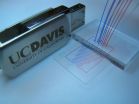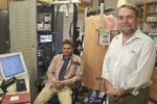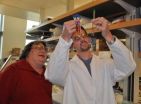(Press-News.org) Biomedical engineers at UC Davis have developed a plug-in interface for the microfluidic chips that will form the basis of the next generation of compact medical devices. They hope that the "fit to flow" interface will become as ubiquitous as the USB interface for computer peripherals.
UC Davis filed a provisional patent on the invention Nov. 1. A paper describing the devices was published online Nov. 25 by the journal Lab on a Chip.
"We think there is a huge need for an interface to bridge microfluidics to electronic devices," said Tingrui Pan, assistant professor of biomedical engineering at UC Davis. Pan and graduate student Arnold Chen - invented the chip and co-authored the paper.
Microfluidic devices use channels as small as a few micrometers across, cut into a plastic membrane, to carry out biological or chemical tests on a miniature scale. They could be used, for example, in compact devices used for medical diagnosis, food safety or environmental monitoring.
Cell phones with increasingly sophisticated cameras could be turned into microscopes that could read such tests in the field.
But it is difficult to connect these chips to electronic devices that can read the results of a test and store, display or transmit it.
Pan thinks that the fit-to-flow connectors can be integrated with a standard peripheral component interconnect (PCI) device commonly used in consumer electronics, while an embedded micropump will provide on-demand, self-propelled microfluidic operations. With this standard connection scheme, chips that carry out different tests could be plugged into the same device -- such as a cell phone, PDA or laptop -- to read the results.
INFORMATION:
The work was supported by a National Science Foundation CAREER award to Pan, and a fellowship to Chen from UC Davis.
A 'USB' for medical diagnosis?
Universal microfluidics connector could find broad use
2010-11-30
ELSE PRESS RELEASES FROM THIS DATE:
Tempest in a teapot: International team of scientists describes swirling natural phenomena
2010-11-30
(Santa Barbara, Calif.) –– Scientists can use cylinders as small as teapots to study the mechanisms involved in powerful hurricanes and other swirling natural phenomena.
The earth's atmosphere and its molten outer core have one thing in common: Both contain powerful, swirling vortices. While in the atmosphere these vortices include cyclones and hurricanes, in the outer core they are essential for the formation of the earth's magnetic field. These phenomena in earth's interior and its atmosphere are both governed by the same natural mechanisms, according to experimental ...
Hormone oxytocin bolsters childhood memories of mom's affections
2010-11-30
Researchers have found that the naturally-occurring hormone and neurotransmitter oxytocin intensifies men's memories of their mother's affections during childhood. The study was published today in Proceedings of the National Academy of Sciences.
Researchers at the Seaver Autism Center for Research and Treatment at Mount Sinai School of Medicine wanted to determine whether oxytocin, a hormone and neurotransmitter that is known to regulate attachment and social memory in animals, is also involved in human attachment memories. They conducted a randomized, double-blind, ...
Caffeinated alcoholic beverages -- a growing public health problem
2010-11-30
San Diego, CA, November 30, 2010 – In the wake of multiple state bans on caffeinated alcoholic beverages (CABs) and an FDA warning to four companies to remove their products from the marketplace, an article published online today in the American Journal of Preventive Medicine delineates the scope of the public health problem and suggests areas of research that might help address it.
"Although several manufacturers of caffeinated beer have withdrawn their products from the market, there is no sign that young people have decreased the practice of combining alcohol and energy ...
Neuroscience of instinct: How animals overcome fear to obtain food
2010-11-30
When crossing a street, we look to the left and right for cars and stay put on the sidewalk if we see a car close enough and traveling fast enough to hit us before we're able to reach the other side. It's an almost automatic decision, as though we instinctively know how to keep ourselves safe.
Now neuroscientists have found that other animals are capable of making similar instinctive safety decisions. In a study published online the week of Nov. 29 in the Proceedings of the National Academy of Sciences, University of Washington researcher Jeansok Kim demonstrates that ...
Motivation to end racism relies on 'yes we can' approach
2010-11-30
If you're trying to end racism, it's not enough to get people to understand that racism is still a problem. You also have to make them feel like they can do something about it, according to a new study published in Psychological Science, a journal of the Association for Psychological Science.
Tracie L. Stewart of Georgia State University was inspired to conduct the study by work she's done on evaluating a popular diversity training program. She found that the program reduced many white participants' bias in the short term, which was good. "But some white participants ...
Abnormal blood vessel function found in women with broken heart syndrome
2010-11-30
ROCHESTER, Minn. - A team of Mayo Clinic researchers has found that patients with broken heart syndrome, also known as apical ballooning syndrome (ABS), have blood vessels that don't react normally to stress. These results offer clues to the cause of this rare syndrome and may help with efforts to identify patients who are more vulnerable to mental stress so that appropriate therapies can be developed. The study is published online in the Journal of the American College of Cardiology.
Apical ballooning syndrome affects mainly postmenopausal women, and a few men. The symptoms ...
Study: Avoidance, poor coping challenge prisoners returning to society
2010-11-30
How do individuals often cope with reentry from prison to society?
Too frequently with avoidance, says Lindsay Phillips, assistant professor of psychology at Albright College in Reading, Pa. and author of the forthcoming paper, "Prison to Society: A Mixed Methods Analysis of Coping with Reentry," to be published by the International Journal of Offender Therapy and Comparative Criminology.
"There is a defined process experienced by participants, which is initial optimism about release, followed by craving substances, facing practical barriers, or feeling overwhelmed," ...
How authentic is your pomegranate juice?
2010-11-30
RIVERSIDE, Calif. – You pick up a bottle of pomegranate juice at the store because you've learned that, although it costs more than most juices, it is replete with antioxidants that bring health benefits. But wait: Is the juice you've purchased really pomegranate juice? Or is the product label you have carefully read promising more than it delivers?
A chemist at the University of California, Riverside is determined to find out. Cynthia Larive, a professor of chemistry, is playing detective by applying chemical tests to juice products sold as pomegranate juice or pomegranate ...
Evolutionary psychology: Why daughters don't call their dads
2010-11-30
CORAL GABLES, FL (December 7, 2010)— Previous research has shown that when women are in their most fertile phase they become more attracted to certain qualities such as manly faces, masculine voices and competitive abilities. A new study by University of Miami (UM) Psychologist Debra Lieberman and her collaborators offers new insight into female sexuality by showing that women also avoid certain traits when they are fertile.
The new study shows that women avoid their fathers during periods of peak fertility. The findings are included in a study entitled "Kin Affiliation ...
U of I scientists develop tool to trace metabolism of cancer-fighting tomato compounds
2010-11-30
URBANA – The University of Illinois scientists who linked eating tomatoes with a reduced risk of prostate cancer have developed a tool that will help them trace the metabolism of tomato carotenoids in the human body. And they've secured funding from the National Institutes of Health to do it.
"Scientists believe that carotenoids—the pigments that give the red, yellow, and orange colors to some fruits and vegetables—provide the cancer-preventive benefits in tomatoes, but we don't know exactly how it happens," said John W. Erdman, a U of I professor of human nutrition.
The ...
LAST 30 PRESS RELEASES:
New study assesses potential dust control options for Great Salt Lake
Science policy education should start on campus
Look again! Those wrinkly rocks may actually be a fossilized microbial community
Exposure to intense wildfire smoke during pregnancy may be linked to increased likelihood of autism
Children with Crohn’s have distinct gut bacteria from kids with other digestive disorders
Genomics offers a faster path to restoring the American chestnut
Caught in the act: Astronomers watch a vanishing star turn into a black hole
Why elephant trunk whiskers are so good at sensing touch
A disappearing star quietly formed a black hole in the Andromeda Galaxy
Yangtze River fishing ban halts 70 years of freshwater biodiversity decline
Genomic-informed breeding approaches could accelerate American chestnut restoration
How plants control fleshy and woody tissue growth
Scientists capture the clearest view yet of a star collapsing into a black hole
New insights into a hidden process that protects cells from harmful mutations
Yangtze River fishing ban halts seven decades of biodiversity decline
Researchers visualize the dynamics of myelin swellings
Cheops discovers late bloomer from another era
Climate policy support is linked to emotions - study
New method could reveal hidden supermassive black hole binaries
Novel AI model accurately detects placenta accreta in pregnancy before delivery, new research shows
Global Physics Photowalk winners announced
Exercise trains a mouse's brain to build endurance
New-onset nonarteritic anterior ischemic optic neuropathy and initiators of semaglutide in US veterans with type 2 diabetes
Availability of higher-level neonatal care in rural and urban US hospitals
Researchers identify brain circuit and cells that link prior experiences to appetite
Frog love songs and the sounds of climate change
Hunter-gatherers northwestern Europe adopted farming from migrant women, study reveals
Light-based sensor detects early molecular signs of cancer in the blood
3D MIR technique guides precision treatment of kids’ heart conditions
Which childhood abuse survivors are at elevated risk of depression? New study provides important clues
[Press-News.org] A 'USB' for medical diagnosis?Universal microfluidics connector could find broad use



